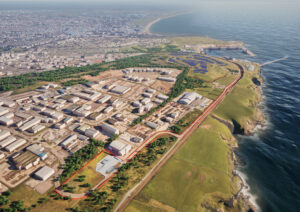Scientists developing green fuels from industrial CO2
Scientists at Loughborough University have created a new chemical process which converts CO2 emissions from industry into green fuels such as methanol, hydrogen and formic acid.
The team at Loughborough have developed several prototype electrochemical and photoelectrochemical devices, powered by wind and solar and tested in lab settings, which draws in polluted air from factories and power plants and convert the carbon dioxide into high-energy, dense liquid fuel.
The next phase of the research, which is supported by the EPSRC and the Royal Society, will be to pilot and test the devices in an industrial setting.
The research follows last weeks Committee for Climate Change report, which said carbon capture usage and storage is crucial to the delivery of a zero-emissions economy, calling it a ‘necessity and not an option’.
The government’s Industrial Strategy Challenge Fund has set a target of having the world’s first net-zero carbon industrial cluster by 2040 and at least one low-carbon cluster by 2030.
The UK’s largest industrial cluster, in Humberside, currently produces 12.6MtCO2 (metric tons of carbon dioxide) a year.
Chemical engineer Dr Jin Xuan, of Loughborough University, said: ‘Over the past years our research has focused on the novel reactors, processes and systems to convert captured CO2 into value-added fuels and chemicals such as formic acid and methanol.
‘We have developed a number of different approaches based on either chemical, electrochemical or photoelectrochemical process to realise the CO2-to-value conversion.
‘We also perform system level carbon audit to ensure the overall negative-emission from life cycle point of view.
‘So far, we have successfully built lab prototypes for the CO2-to-fuel process and have had several papers published.
‘The goal is to have the system integrated into the industrial clusters — iron, steel and chemical factories — to capture the CO2 from industrial processes and transform them into useful fuels.
‘The device will be driven by renewable energy such as wind and solar and we are currently in the process of developing them for demonstrations in real systems.’
Photo credit – Loughborough University.

















